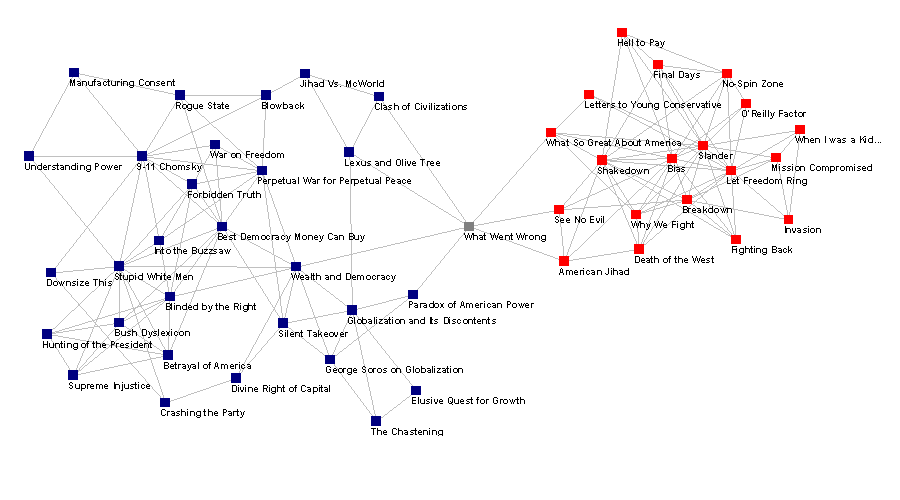|
|
|
Divided We Stand???
After a recent on-line discussion about politics and political books in America, I wondered, what do our book buying patterns reveal about us?
In the diagram above, two books are linked if they were bought together at a major retailer on the web. I call these 'buddy books'. A link was drawn if either book of a pair listed the other as a buddy. The data made public by the retailer shows just the 'best buddies' -- the strongest ties. Other patterns may emerge with investigation of weaker ties. The data was gathered January 2003.
Using snowball sampling -- following the connections between books -- two distinct clusters emerge. There is only one book that spans both clusters. Lightly-connected books, with two links or less, were removed. None of the removed books played a key role in the network -- they were satellites, on the periphery of one of the clusters.
The actual political affiliation of each book buyer is not known, not even by the web retailer. Yet, after thousands of data points, this emergent pattern is curious. Although the data was collected uniformaly across all shown books, the cluster on the right contains less books. These readers kept selecting the same few books -- their clique of books is dense -- 39%. Most books have highly overlapping buddy lists. Slander, Bias, and Let Freedom Ring are the most popular buddies in this cluster.
The cluster on the left reveals a broader array of books. This network is less dense -- 19%. It even contains two books [Lexus and the Olive Tree and Clash of Civilizations], on the periphery of the cluster, that most people would not group with the other books in this cluster. Is this group partially open to other views? Yet, they have their favorites also -- Stupid White Men shows up on almost half of the buddy lists.
If the network of books is a proxy for the network of individuals who read them -- what does the network map reveal? At least amongst book readers there appears to be two obvious divisions in political thought. All though academics and political pundits may read books from both clusters, the common reader obviously does not. They choose books with similar opinions again and again.
It appears that echo chambers have emerged that repeat a consistent message within each cluster. Ron Burt, a leading network expert, explains that a tightly closed network "amplifies predispositions, creating a structural arthritis in which people cannot learn what they do not already know"[PDF...]. With no direct bridges between the clusters, these divisions are unlikely to change any time soon.
Interested in reading more? See my original 1999 white paper on book networks.
See the new 2004 political book network map!
Copyright © 2003, Valdis Krebs
